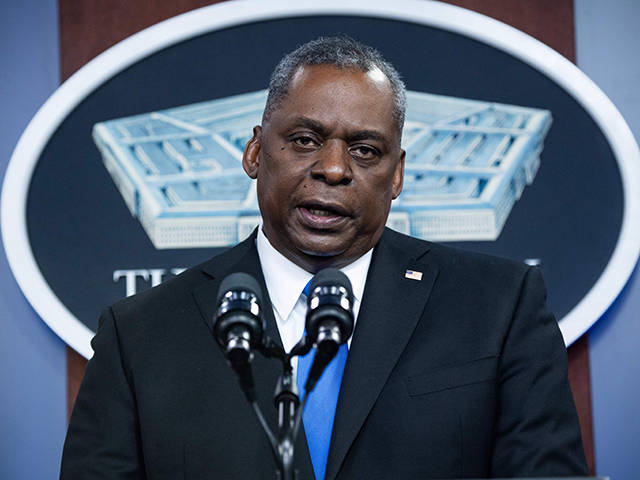Defense Secretary Lloyd Austin told allies at the NATO defense ministerial on Thursday that the administration of President Joe Biden would not “undertake a hasty or disorderly withdrawal from Afghanistan,” suggesting a reconsideration of the May 2021 withdrawal date set by predecessor Donald Trump.
American armed forces will mark 20 years in Afghanistan in October 2021 in the event that Biden does not withdraw.
The Trump administration negotiated a peace agreement with the Taliban last year in an attempt to end America’s presence in the country. The deal would see American forces leave Afghanistan in May 2021 if the Taliban committed to ceasing its attack on the U.S. military and cut its ties to international jihadists groups like al-Qaeda. The Taliban agreed to the deal and has largely appeared to keep the first promise, but international observers have found little indication that the jihadists have attempted to end their relationship with similar groups. Taliban attacks on Afghan government forces have also increased as attacks on Americans have fallen.
Both the Taliban and the U.S. government have accused each other of failing to meet their commitments. This week, the head of the Taliban, Mullah Abdul Ghani Baradar, published an open letter to the American people urging U.S. forces to leave.
NATO reaffirmed its commitment to Afghanistan this week. New Zealand, an allied nation that responded to America’s call to arms in the aftermath of the September 11, 2001, terrorist attacks, withdrew its last remaining forces in the country this week.
Austin, according to the Defense Department’s readout of his remarks, told fellow NATO defense chiefs that America would not abruptly end its presence in Afghanistan, presumably even if Washington had previously committed to withdrawing by a certain date.
Austin “told the Allies that the U.S. is conducting a thorough review of the conditions of the U.S.-Taliban Agreement to determine whether all parties have adhered to those conditions,” the readout read. “And he made clear that he is committed to consulting with Allies and partners throughout this process.”
“He reassured Allies that the U.S. would not undertake a hasty or disorderly withdrawal from Afghanistan,” the statement continued.
Austin appeared to make similar remarks regarding the Biden administration’s position in America’s presence in Iraq, stating that the administration is committed to “the enduring defeat of ISIS, respecting Iraq’s sovereignty, and ensuring long-term regional stability.” Austin “welcomed” the news that NATO would soon send thousands of more troops into Iraq in response to a rocket attack on Erbil, the capital of the Kurdistan Regional Government (KRG), this week. Unlike in Afghanistan, the Trump administration did not make any prior commitments to leaving the country, particularly in light of the increasing influence of Iran-backed militias forming part of the Popular Mobilization Forces (PMF), a Baghdad-approved coalition. A PMF member guerrilla took responsibility for the Erbil attack.
Austin joins others in the Biden administration who had indicated that Biden may not feel comfortable committing to a withdrawal from Afghanistan by may. Pentagon spokesman John Kirby accused the Taliban in January of having broken the peace agreement, making a full withdrawal difficult for Washington.
“We are still involved in trying to get a negotiated settlement. The Taliban have not met their commitments,” Kirby said at the time. “As you know, there is a looming deadline of early May … but without them meeting our commitments to renounce terrorism and to stop the violent attacks on the Afghan National security forces and by dint of that the Afghan people, it’s very hard to see a specific way forward for the negotiated settlement.”
Kirby insisted that withdrawal from Afghanistan would be “driven by our security requirements.”
On the ground, Gen. Austin S. Miller, the commander of US and NATO forces in Afghanistan, told Reuters last week that any peace process would be “very, very difficult” if the Taliban did not scale back its violence, which has increased towards Afghan forces though not directly towards Americans.
The Taliban officially refers to itself as the “Islamic Emirate of Afghanistan” and considers itself the only legitimate government of the country. It deems the true government of Afghanistan a usurper institution and, despite agreements with the United States, has largely refused to negotiate with Kabul.
Baradar, the head of the Taliban, nonetheless urged Washington to withdraw from Afghanistan as soon as possible in a letter this week.
“Now that a year has passed since the signing of the Doha agreement, we urge the American side to remain committed to the full implementation of this accord,” Baradar said, referring to the agreement with the Trump administration. “We are fully confident that the Afghans themselves can achieve the establishment of an Islamic government and enduring peace and security through intra-Afghan dialogue.”
Baradar claimed that the Taliban is “sincerely committed to finding a political solution to the ongoing conflict.” He notably failed to emphasize that the Taliban have repeatedly insisted in the dissolution of the Afghan government and its return to power as part of that “political solution.”
The Taliban is believed to control at least half the territory of Afghanistan and wield power over more than half the population.

COMMENTS
Please let us know if you're having issues with commenting.